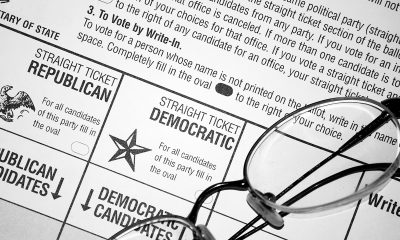District of Columbia
Thousands attend March for Our Lives rally in D.C.
Sunday marks six years since the Pulse nightclub massacre
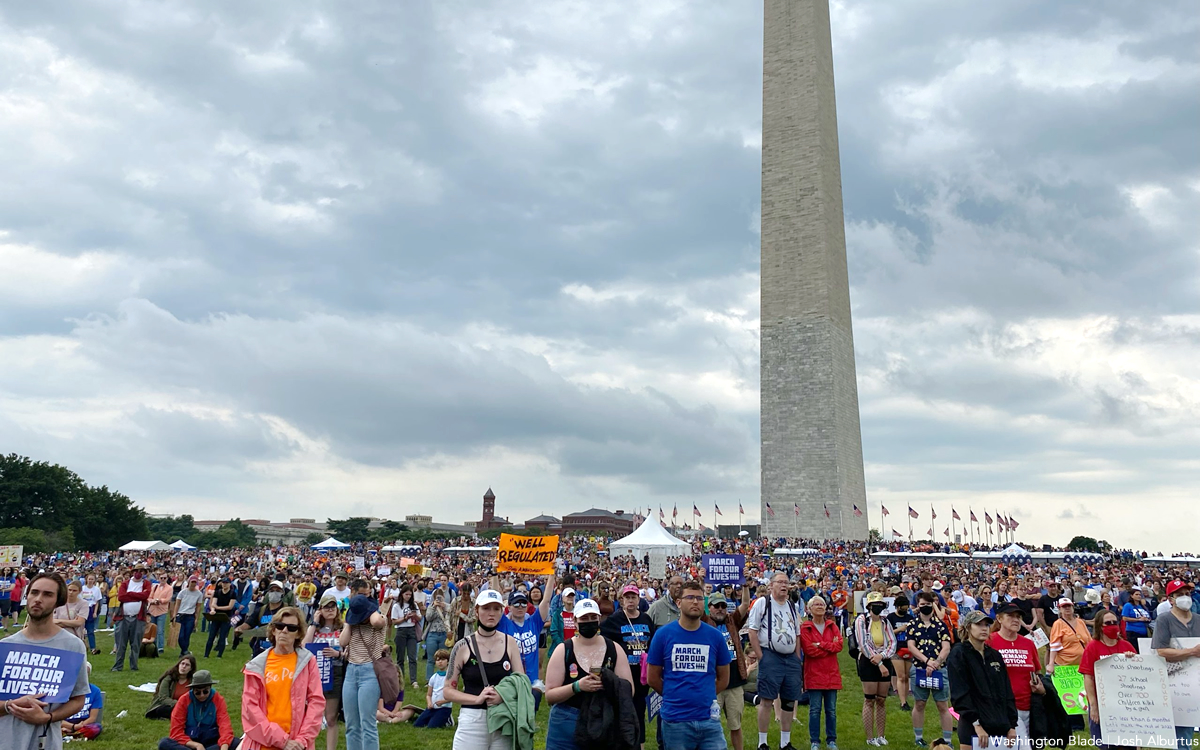
On the night of June 12, 2016, 49 people were killed and 53 were injured in a mass shooting at the Pulse nightclub in Orlando, Fla. The shooting has since remained one of the deadliest mass shootings in U.S. history.
Six years later, efforts to curb gun violence in America and halt the country’s epidemic of mass shootings have reignited in the wake of more recent mass shootings.
Just before noon on Saturday thousands of people carrying signs and clad in anti-gun-violence clothing flooded the north lawn of the Washington Monument.
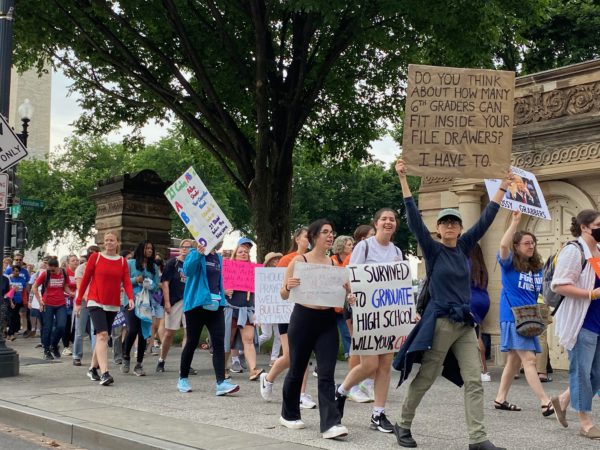
(Washington Blade photo by Josh Alburtus)
One of those in the crowd was Jessica Mahoney, a young activist with ties to a national past littered with gun violence.
“My close family is from Sandy Hook and, as the sign references, I used this sign four years ago,” Mahoney said. “This has been a very personal issue for me since 2012 when I had to spend over an hour wondering if my cousins were alive or not. I just feel like it’s so important that people are out here that haven’t been personally touched by the issue because I just think that shows that there’s a real movement behind what’s going on.”
Mahoney and her fellow protesters in the crowd were some of the hundreds of thousands more protestors who marched in different cities across the country on that day calling on state and federal lawmakers to pass legislation reforming the nation’s gun laws.
The marches, organized in large part by the youth-led gun violence prevention organization March for Our Lives, were triggered by a sustained national outcry for action following the latest mass shootings at Robb Elementary School in Uvalde, Texas, and a Tops Friendly Market in Buffalo, N.Y, both in late May. The organization held similar nationwide rallies in 2018 following the Parkland school shooting that led to the group’s inception.
Mahoney described her feelings about having to return to another rally four years later in an effort to address the same issue.
“It’s frustrating and a bit maddening at times to be honest that we still have to do this,” Mahoney said. “But it just seems like there’s more energy every time and so I think that I’m also hopeful about it.”
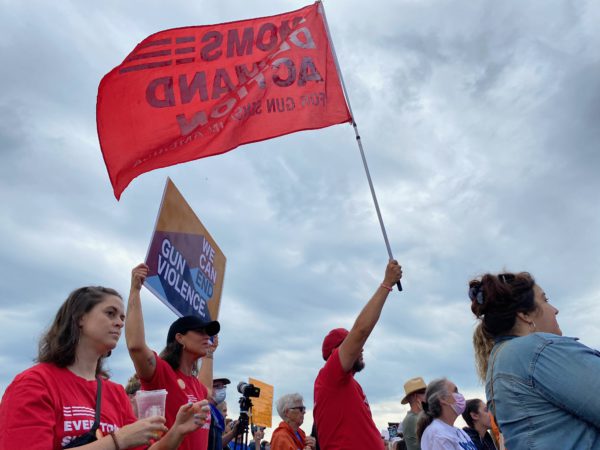
The issue has been one plaguing Americans in various settings and from various walks of life and has affected those across a spectrum of identities, including the LGBTQ community.
Marking the sixth anniversary of the Pulse shooting in Orlando, the Human Rights Campaign released a statement the day before the March for Our Lives rally.
“Gun violence remains an LGBTQ+ issue, with three-fourths of homicides against transgender people — including nearly eight in 10 homicides of Black trans women — involving a gun,” Interim HRC President Joni Madison said in the statement. “Compounding this tragedy is the fact that in the six years since Pulse, we have been unable to advance meaningful federal gun reform legislation.”
But in an effort to prevent future mass killings like those in Parkland, Uvalde, Buffalo and Orlando, prominent activists have since brought a spotlight to the issue of gun violence in America. Many such activists descended on the grounds of the Washington Monument on Saturday to speak to those gathered and amplify their message.
David Hogg, a survivor of the mass shooting on February 14, 2018, at Marjory Stoneman Douglas High School in Parkland, Fla., and a founder and board member of March for Our Lives, spoke to the crowd.
“We need to stop these shooters before they get on campus and stop endangering the lives of our first responders, our students, our teachers because people on Capitol Hill don’t want to do their job and protect us,” Hogg said.
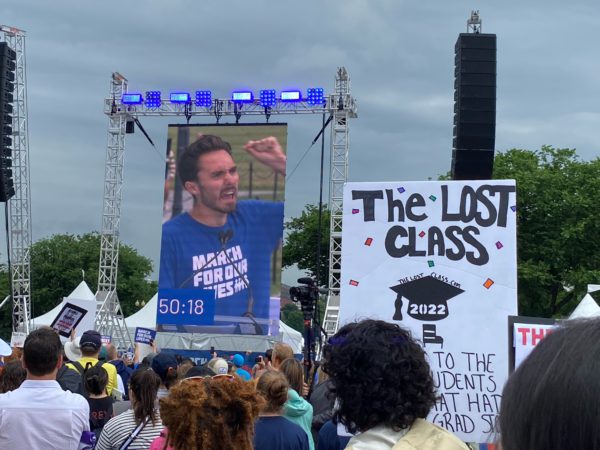
(Washington Blade photo by Josh Alburtus)
Alongside Hogg were a number of other activists and politicians who shared the goal of reducing gun violence in America, including D.C. Mayor Muriel Bowser and U.S. Rep. Cori Bush (D-Mo.).
Bush described her own proximity to gun violence in calling for action, sharing with the crowd her past escape from such as she ran from an abusive partner who kept firearms in their home.
“When I turned back for a moment, because, ‘Why isn’t he chasing me?’” Bush said. “I turned back, and I saw him standing still, ‘Why is he standing still?’ Next thing I knew, I heard shots.”
Bush believed the near-death experience to be “completely preventable.”
“Closing the boyfriend loophole could’ve saved me from a near-lethal encounter with gun violence,” Bush said. “A red flag law could’ve saved me from a nearly lethal encounter with gun violence.”
Hogg and others took aim at counterarguments from pro-gun entities that have advocated for mental health support rather than gun reform to solve the problem.
“We also must address the fact that mental health does have a role to play in stopping gun violence, but that racism is not a mental illness,” Hogg said. “Hatred, racism, radicalization, xenophobia are not mental illnesses.”
But even at an event meant to highlight what gatherers felt was a need to curb the nation’s scourge of gun violence, the specter of fear and violence remained ubiquitous.
During a moment of silence for the victims of America’s gun violence, a man toward the front of the crowd began to shout and attempted to breach the event’s main stage. A source close to the stage told the Washington Blade that the man threw a megaphone into the crowd while shouting, “I am God.”
Those assembled feared the worst. Due to the size of the crowd that had assembled, rallygoers across the lawn perceived the disturbance to be an active gun threat. Hundreds dropped flat to the ground while others ran from the stage in an attempt to escape the potential violence.
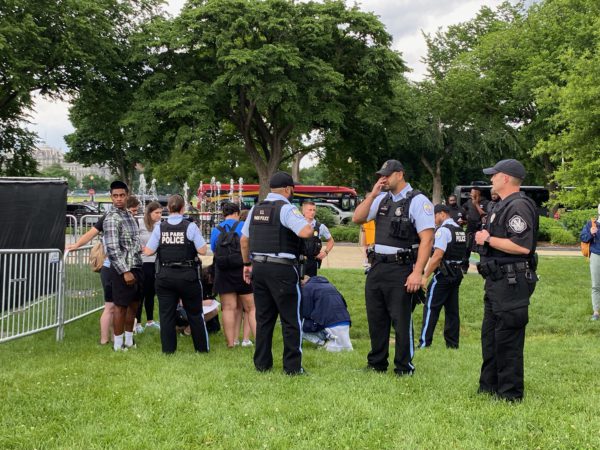
After organizers and police were able to apprehend the disruptor, rally organizers attempted to reconvene the frightened crowd and push forward.
“Do not run, freeze, do not run,” an organizer said over the sounds of emerging police sirens. “There is no issue here, do not run.”
But the moment of fear clung to many who were present.
Rallygoer Kirsten Hiera witnessed the moment of mass confusion but was unable to flee the scene despite her own fear.
“I was scared but I didn’t want to run away because I’m with someone who’s elderly and I didn’t want to have her be abandoned,” Hiera said. “I felt scared and confused but I didn’t want to abandon my friend.”
As those gathered began to tepidly rise and return to the stage, the organizer proceeded to draw attention back to the focus of the rally, leading a chant exclaiming peace to be a lifestyle.
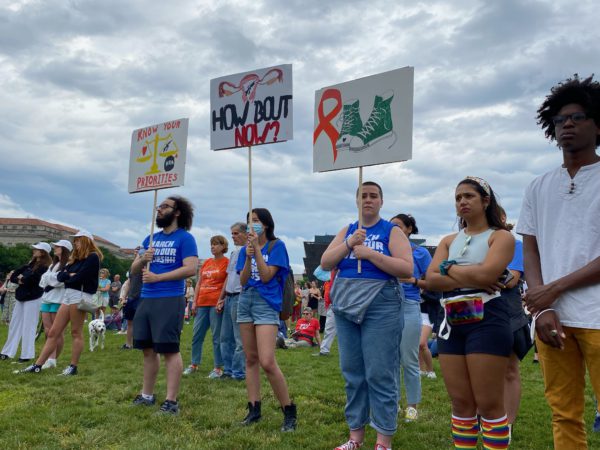
Exiting the stage toward the end of the rally after the crowd had reconvened, the organizer left them with advice that touched to the core of the movement’s mission — one that, in the wake of tens of thousands of gun deaths in shootings like Orlando, organizers like Hogg have described as not pro-gun or anti-gun, but pro-peace.
“The other thing that I want to say is let’s not give into the hate,” she said. “Let’s not give into the hate. There’s more people who are about love than there is that is about hate.”
District of Columbia
Gay ANC member announces candidacy for Ward 1 D.C. Council seat
Community leader Brian Footer seeking seat held by Brianne Nadeau

Gay Advisory Neighborhood Commissioner Brian Footer, a community activist who has been involved for many years in local and national government affairs, has announced his candidacy for the Ward 1 D.C. Council seat up for election in 2026.
Footer, a Democrat, will be running in the city’s June 2, 2026, Democratic primary for the Ward 1 Council seat, but it is uncertain whether he will be running against incumbent Ward 1 Council member Brianne Nadeau (D). Nadeau has not yet announced if she plans to run for re-election for a fourth term following her 12 years on the Council.
Nadeau has been a longtime vocal supporter of the LGBTQ community.
If Footer were to win the primary and the November 2026 general election, he would become the Council’s second openly gay member. Ward 5 Council member Zachary Parker (D) is currently the 13-member Council’s only gay member.
Footer is a three-term ANC commissioner who currently serves as Chair of ANC 1E, which represents the city’s Adams Morgan neighborhood.
“Brian has worked at every level of government — federal, state, and local — building a career rooted in public service, aging policy, and inclusive urban planning,” a statement on his campaign website says.
“I’m running for Council because too many people in Ward 1 are doing everything right and still feel ignored by the city they call home,” Footer states on his website.
“I’m running because we can do better,” his statement continues. “That means making housing more affordable, addressing homelessness with real solutions, and keeping our neighborhoods safe with smart, community focused strategies.”
When contacted by the Washington Blade for comment, Nadeau said she was not ready at this time to discuss her plans about running again or about Footer’s candidacy.
“The primary is a ways away, and I’m very focused right now on the budget and the stadium deal and all the work that we’re doing at the Council,” she told the Blade. “So, I really haven’t had time to turn to my plans. So, as a result, I’m also not going to be commenting on anybody else who is determined that they’re running at this time.”
She first won election to the Council in 2014 after she defeated four-term gay Ward 1 Council member Jim Graham in the Democratic primary after Graham became embroiled in an ethics controversy.
In the 2022 Democratic primary Nadeau defeated gay challenger Salah Czapary in a three-candidate race, by a margin of 48.5% of the vote compared to Czapary’s 30.9%.
With the third candidate, Sabel Harris, receiving 20.4%, the outcome showed that the two challengers had a combined total vote count higher than Nadeau.
Further details of Footer’s candidacy can be accessed from his campaign website, brianfooterdc.com.
District of Columbia
Gay GOP group hosts Ernst, 3 House members — all of whom oppose Equality Act
Log Cabin, congressional guest speakers mum on June 25 event

U.S. Sen. Joni Ernst (R-Iowa) and three women Republican members of the U.S. House appeared as guest speakers at the June 25 meeting of Log Cabin Republicans of D.C., the local chapter of the national LGBTQ Republican group with that same name.
The U.S. House members who joined Ernst as guest speakers at the Log Cabin meeting were Celeste Maloy (R-Utah), Kat Cammack (R-Fla.), and Julia Letlow (R-La.).
Neither D.C. Log Cabin Republicans President Andrew Minik nor spokespersons for Ernst or the three congresswomen immediately responded to a request by the Washington Blade for comment on the GOP lawmakers’ appearance at an LGBTQ GOP group’s meeting.
“Please join us for an inspiring evening as we celebrate and recognize the bold leadership and accomplishments of Republican women in Congress,” a D.C Log Cabin announcement sent to its members states.
“This month’s meeting will highlight the efforts of the Republican Women’s Caucus and explore key issues such as the Protection of Women and Girls In Sports Act and the broader fight to preserve women’s spaces in society,” the message says.
It was referring to legislation pending in Congress calling for banning transgender women from participating in women’s sports events.
According to media reports, Ernst and the three congresswomen have expressed opposition to the Equality Act, the longstanding bill pending in Congress calling for prohibiting discrimination based on sexual orientation and gender identity in the areas of employment, housing, and public accommodations.
The Log Cabin announcement says the meeting was scheduled to take place at the Royal Sands Social Club, which is a restaurant and bar at 26 N St., S.E. in the city’s Navy Yard area.
D.C. Log Cabin member Stuart West, who attended the meeting, confirmed that Ernst and the three congresswomen showed up and spoke at the event.
“It was a good turnout,” he said. “I would definitely say probably 30 or 40 people attended.” West added, “Four women came to talk to a group of mostly gay men. That’s something you don’t see very often.”
District of Columbia
D.C. police seek public’s help in July 5 murder of trans woman
Relative disputes initial decision not to list case as hate crime

D.C. police are seeking help from the public in their investigation into the murder of a transgender woman who they say was shot to death at about 12:30 a.m. on Saturday, July 5, on the 2000 block of Benning Road, N.E.
But the police announcement of the fatal shooting and a police report obtained by the Washington Blade do not identify the victim, 28-year-old Daquane ‘Dream’ Johnson of Northeast D.C., as transgender. And the police report says the shooting is not currently listed as a suspected hate crime.
It was local transgender activists and one of Johnson’s family members, her aunt, who confirmed she was transgender and said information they obtained indicates the killing could have been a hate crime.
“On Saturday, July 5, at approximately 12:51 a.m., Sixth District officers were flagged down in the 2000 block of Benning Road, Northeast, for an unconscious female,” a July 5 D.C. police statement says. “Upon arrival, officers located an adult female victim suffering from gunshot wounds,” it says.
“D.C. Fire and EMS responded to the scene and transported the victim to a local hospital where after all lifesaving efforts failed and the victim was pronounced dead,” the statement says.
A separate police flyer with a photo of Johnson announces an award of $25,000 was being offered for information leading to the arrest and conviction of the person or persons responsible for the murder.
The flyer identifies D.C. police Homicide Detective Natasha Kennedy as being the lead investigator in the case and says anyone with information about the case should contact her at 202-380-6198.
Longtime D.C. transgender rights advocate Earline Budd told the Blade that one of the police investigators contacted her about the case and that she also spoke to Detective Kennedy. Budd said police confirmed to her that Johnson was a transgender woman.

One of Johnson’s family members, Vanna Terrell, who identified herself as Johnson’s aunt, told the Blade that Johnson used the first name of Dream and had planned to legally adopt that name instead of Daquane but had not gotten around to doing so.
Terrell said she and other family members learned more about the incident when one of two teenage high school students who knew Johnson’s brother contacted a friend and told the friend that they recognized Johnson as they witnessed the shooting. Terrell said the friend then called her to tell her what the friend learned from the two witnesses.
According to Terrell, the witnesses reportedly saw three men approach Johnson as Johnson walked along Benning Road and one of them called Johnson a derogatory name, leading Terrell to believe the men recognized Johnson as a transgender woman.
Terrell said one of the witnesses told the friend, who spoke to Terrell, that the man who shot Johnson kept shooting her until all of the bullets were fired. Budd, who said she spoke to Terrell, who also told her what the witnesses reported, said she believed the multiple shots fired by the shooter was an “overkill” that appears to have been a hate crime. Terrell said she too believes the murder was a hate crime.
In response to an inquiry from the Blade, Officer Ebony Major, a D.C. police spokesperson, stated in an email, “At this point there is nothing in the investigation that indicates the offense was motivated by hate or bias.”
Terrell said a memorial gathering to honor Johnson’s life was scheduled to be held Saturday, July 12, at River Terrace Park, which is located at 500 36th St., N.E. not far from where the shooting occurred.

-

 Federal Government2 days ago
Federal Government2 days agoTreasury Department has a gay secretary but LGBTQ staff are under siege
-

 Virginia3 days ago
Virginia3 days agoDefying trends, new LGBTQ center opens in rural Winchester, Va.
-

 District of Columbia2 days ago
District of Columbia2 days agoGay GOP group hosts Ernst, 3 House members — all of whom oppose Equality Act
-

 Opinions4 days ago
Opinions4 days agoUSAID’s demise: America’s global betrayal of trust with LGBTQ people

